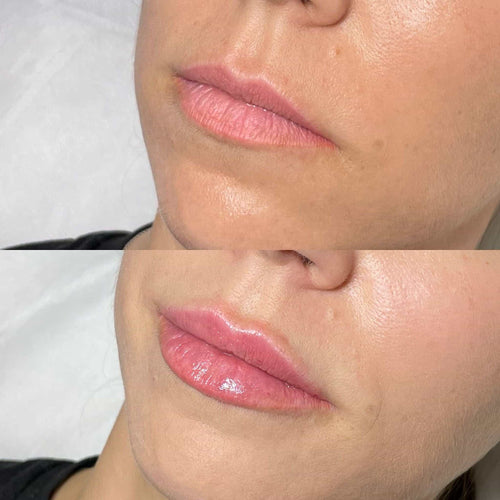Can You Have Lip Filler When Pregnant
Book a Dermal Filler Session with Dr. Laura Geige Now
Medical Concerns Associated with Lip Fillers During Pregnancy
The administration of lip fillers during pregnancy poses several medical concerns, primarily due to the unknown effects of these substances on the fetus.

Radiological studies have shown that some materials used in lip fillers, such as hyaluronic acid, may pass through the placenta and reach the fetus.
This raises concerns about potential complications, including an increased risk of miscarriage, premature labor, or fetal malformations.
Moreover, the use of lip fillers during pregnancy may also increase the risk of blood-borne infections, as the filler material could be contaminated with pathogens that can be transmitted to the fetus.
The type of filler used is also a crucial factor. For example, calcium hydroxylapatite fillers have been shown to be safe in animal studies, but their safety and efficacy in humans during pregnancy have not been established.
On the other hand, permanent fillers such as silicone-based fillers are not recommended for use during pregnancy due to the potential for long-term health complications.
The risks associated with lip filler administration during pregnancy can be minimized by choosing a qualified and experienced injector who follows proper protocols for preparing patients for fillers during pregnancy.
Additionally, it is essential to carefully evaluate the benefits and risks of using lip fillers during pregnancy, weighing the potential risks against any aesthetic concerns.
The American College of Obstetricians and Gynecologists (ACOG) has stated that there is insufficient evidence to support the use of injectable fillers during pregnancy, and that any decision to undergo treatment should be made in consultation with a healthcare provider.
Furthermore, women who are planning to become pregnant or are already pregnant should avoid using lip fillers until after their child is born, when the risks associated with filler administration have been minimized.
It is also crucial for patients to note that some lip fillers contain medications such as lidocaine or benzocaine, which can be problematic during pregnancy due to the potential for systemic absorption and adverse effects on the fetus.
Accidental injection of lip fillers into an artery or vein can cause a range of complications, including embolism, stroke, or even death in rare cases.
The risk of such accidents increases when using lip fillers during pregnancy, as blood vessels may be more fragile and prone to rupture due to hormonal changes and other factors.
Given the potential risks associated with lip filler administration during pregnancy, women who are pregnant or planning to become pregnant should exercise extreme caution and consult a qualified healthcare provider before undergoing any cosmetic procedures.
Book a Dermal Filler Appointment with Dr. Laura Geige Today
Risks of Lip Filler Reactions During Pregnancy
Lip fillers have become increasingly popular over the years, especially among pregnant women who want to maintain their beauty standards despite the changing shape of their body.
However, it’s essential to acknowledge that lip fillers are a form of cosmetic treatment that involves injecting substances into the lips to enhance their appearance.
During pregnancy, the body undergoes significant changes that can affect the skin, including increased blood volume and hormonal fluctuations.
These changes can lead to swelling, bruising, and other complications after lip filler injections, making it crucial for expectant mothers to carefully consider the risks involved before undergoing this treatment.
Risks of lip filler reactions during pregnancy include allergic reactions, infection, and scarring, which can be painful and potentially serious.
Another significant risk is the transmission of blood-borne pathogens, such as hepatitis or HIV, through contaminated equipment or needles.
Reserve Your Dermal Filler Consultation with Dr. Laura Geige Now
Additionally, lip fillers can cause swelling and bruising in other areas of the face, including the cheeks, nose, and eyelids, which can be unsightly and uncomfortable.
Furthermore, some women may experience facial asymmetry or unevenness after lip filler injections, which can lead to self-consciousness and embarrassment.
More serious complications can also arise, such as lip filler granulomas or nodules, which are collections of inflammatory cells that can form in response to the injected substance.
The risk of these complications is higher when lip fillers are administered during pregnancy due to the increased sensitivity and vulnerability of the skin at this stage.
Therefore, it’s essential for pregnant women to carefully research the risks and benefits of lip fillers before making an informed decision about undergoing treatment.
This includes discussing their medical history, current health status, and any concerns or questions they may have with a qualified healthcare professional or dermatologist.
A thorough consultation will help determine whether lip fillers are safe for pregnant women to undergo, as some substances used in lip filler treatments may not be compatible with pregnancy or certain medications.
Researching the types of lip fillers available, their ingredients, and any potential risks or side effects is also crucial for expectant mothers who want to make an informed decision about their cosmetic treatment.
The American College of Obstetricians and Gynecologists (ACOG) emphasizes the importance of caution when it comes to cosmetic procedures during pregnancy, advising women to wait until after childbirth before undergoing any non-essential treatments.
Similarly, the American Society for Dermatologic Surgery (ASDS) recommends that women avoid lip fillers during pregnancy, citing concerns about potential complications and the lack of scientific evidence supporting their safety in this context.
Ultimately, pregnant women should prioritize their health and well-being over aesthetic considerations, carefully weighing the risks and benefits of any cosmetic treatment before making a decision.
Avoiding lip fillers until after pregnancy is often the safest option, allowing expectant mothers to minimize potential complications and ensure the best possible outcome for both themselves and their unborn child.
Read more about Bronzed Body Spray Tan here. Read more about Cleveland Relationship Therapy here. Read more about Cafe Sant Jaume Valencia here. Read more about Azmia Magane here.
- Retinol Peel Near Caterham, Surrey - June 1, 2025
- Obagi Nu-Derm System For Anti-aging In Kingston Upon Thames Surrey London - June 1, 2025
- The Emotional Aftermath Of Ghosting And How To Find Closure - May 31, 2025
